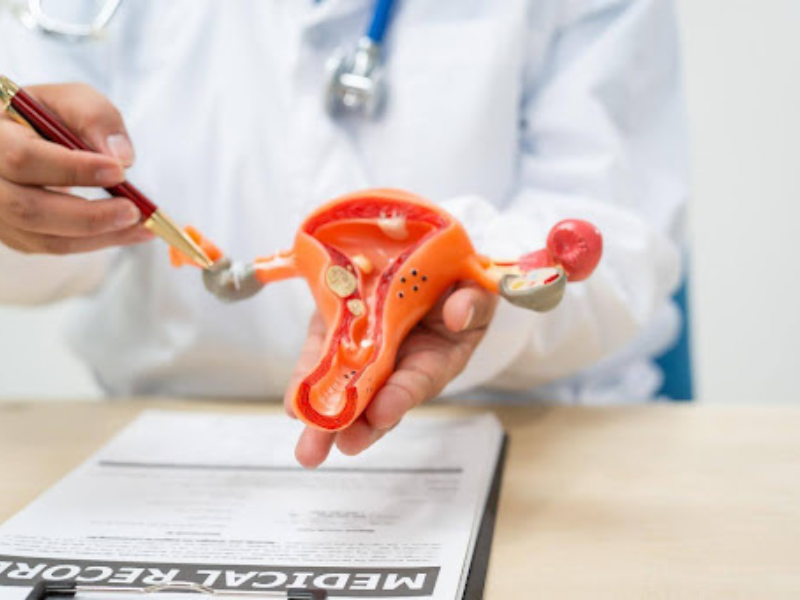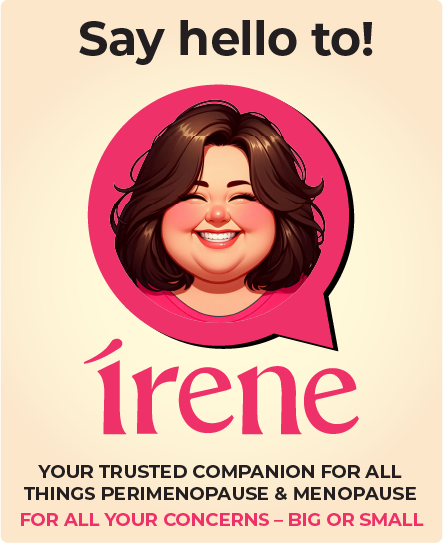
What Is The Relationship Between Oophorectomy And Menopause?
Menopause is a second inning in women’s lives which differs in having ended reproductive years and some new normal symptoms including hot flashes, night sweats, mood swings, hypertension, and so forth. This is due to the decline in the functionality of the ovaries, which produce hormones like estrogen and progesterone.
While menopause is natural for some women, this transition is not entirely natural for others- It’s brought on by surgery. One common surgery that can induce menopause is an oophorectomy, the removal of one or both of the ovaries. Whether due to health conditions or preventive measures, an oophorectomy can profoundly impact your body, particularly on your hormonal balance and menopause experience.
This blog will help you discover the relationship between oophorectomy and menopause, what happens when you undergo oophorectomy before or after menopause, and how to manage the symptoms after oophorectomy.
What is Oophorectomy and Why?
It is a biological term that means the surgical removal of one or both ovaries. Ovaries are the vital organs that in response to the hormones (estrogen and progesterone) produce eggs monthly, regulate your menstrual cycle, and play crucial roles in various bodily functions.
Due to certain medical conditions including endometriosis, cysts, ovarian disorders, positive for breast and ovarian cancer genes (BRCA 1 and BRCA2 mutations), etc., medical practitioner advice for oophorectomy. The surgical removal of ovaries in such cases may indeed be a lifesaving step however, the life after this surgery is not so easy.
Types of Oophorectomy
- Unilateral Oophorectomy: Removal of only ovary.
- Bilateral Oophorectomy: Removal of both the ovaries.
- Salpingo-Oophorectomy: Removal of one or both the ovaries with fallopian tubes.
Oophorectomy is often performed in conjunction with the removal of the uterus which is called hysterectomy but this is not always the case. Medical practitioners recommend an oophorectomy if they suspect the presence/ risk of:
- Ovarian Cysts or Tumors
- Endometriosis
- Ovarian Cancer (Presence of Genetic Mutations)
- Hormones Sensitive Breast Cancer
Both pre-and post-menopausal women are susceptible to all the risks mentioned above. If you are considering or have already undergone an oophorectomy, understanding how it impacts your experience with menopause is crucial.
Does Oophorectomy Cause Menopause?
When both ovaries are removed before you naturally reach menopause, you will experience what is known as surgical menopause. Due to oophorectomy, your body suffers from a sudden fall in hormone levels, leading to an immediate onset of menopause symptoms, regardless of your age.
Unlike natural menopause, which occurs gradually, the changes brought on by surgical menopause are more sudden, frequent, and severe. Here are the symptoms that a woman might be stricken with following oophorectomy:
- Hot Flushes: Sudden feeling of intense heat especially in the neck, head, and chest region, often accompanied by excessive sweating.
- Night Sweats: Excessive sweating during sleep, leads to the disrupted sleep
- Mood Swings: Due to declined hormones, emotional well-being gets badly impacted and results in anxiety, irritability, depression, and hypertension.
- Sleep Disturbances or Insomnia: Due to disrupted hormonal balance, frequent hot flashes, and night sweats, the quality of sleep is disturbed and eventually leads to insomnia.
- Cognitive Changes: Estrogen has a proven neuroprotective role which upon declining, affects cognition. Experiencing women may face difficulty concentrating which is called ‘brain fog’.
- Vaginal Dryness: A decrease in estrogen levels can cause dryness in the vaginal tissues, which may lead to discomfort during sexual intercourse. It also increases the risk of infections.
- Weight Gain: Hormonal shifts may affect metabolism, causing the experiencing women to gain weight faster after oophorectomy.
- Risk of Osteoporosis: Estrogen plays a key role in maintaining bone density and due to the sudden fall of this hormone, the bones become more prone to fractures and osteoporosis.

It is worth mentioning here that the severity of symptoms varies from woman to woman. While the symptoms are mild for some women, others may find their symptoms overwhelming.
Oophorectomy After Menopause: Do the Symptoms Change?
If you are already in the second inning of your life (natural menopause) and then undergo an oophorectomy, you may wonder if your experience will differ. The truth is, although your body has already gone through the natural decline in estrogen and progesterone, removing the ovaries can still have some consequences, especially if you retained some ovarian functions post-menopause.
The fact behind this is, that even after a few years of menopause, the ovaries continuously produce small amounts of hormones. Oophorectomy at this stage can eliminate the residual hormone production, potentially causing some late-onset menopausal symptoms which may be:
- Cardiovascular Disorders: Estrogen helps protect the cardiovascular system but in the case of oophorectomy, estrogen levels get down and make the women susceptible to heart-related issues.
- Sexual Health: Declined estrogen leads to vaginal dryness in some women which makes the intercourse discomfort.
- Obesity: Estrogen helps maintain the metabolism of the body. After an oophorectomy, the reduction of estrogen slows down the metabolic processes. Due to this, women may experience a drop in BMR (Basal Metabolic Rate) and therefore are at high risk of gaining weight. Moreover, reduced estrogen levels can lead to insulin resistance, making it harder for the body to regulate blood sugar levels.
Navigating the Menopause-like Symptoms After Oophorectomy
Now that it is clear how oophorectomy can trigger or exacerbate menopausal symptoms, it’s time to talk about how to manage them (that too when it is not the age of natural menopause).
Let’s discuss some key strategies:
- Hormone Replacement Therapy (HRT): It is one of the most effective treatment regimens for managing the sudden loss of hormones after oophorectomy. It helps replenish the hormones your ovaries used to produce, particularly estrogen and sometimes progesterone. This therapy is reported to alleviate many of the common symptoms like hot flashes, vaginal dryness, mood swings, and night sweats. However, it is not suitable for all women as many cases of blood clots, stroke, and even cancer are reported after using the therapy. Therefore, it’s imperative to discuss with your doctor whether HRT is appropriate for you based on your health history, especially if you had an oophorectomy due to cancer risk.
- Vaginal Estrogen Therapy: Unlike systemic HRT, this therapy delivers estrogen directly to the vaginal tissues, which helps in alleviating dryness, discomfort during intercourse, and urinary symptoms without affecting the rest of your body.
- Non-Hormonal Treatments: For women who do not prefer to use HRT, there are non-hormonal options to consider including:
- Herbal Supplements: Certain herbs containing estrogenic compounds like evening primrose, licorice, and black cohosh are often marketed for relieving menopausal symptoms. Although these are herbs and have negligible side effects, their dosage and directions for using them must be advised.
- Antidepressants: Some types of antidepressants, particularly SSRIs (Selective serotonin reuptake inhibitors), have been found to help with hot flashes and mood swings.
- Lifestyle Changes: A healthy lifestyle can go a long way in helping you manage menopause symptoms. Here are some changes that may help:
- Exercise: Practicing regular walking, strength training, and yoga can help maintain bone density and manage weight. Along with this, daily exercises also boost mood and reduce stress.
- Diet: Focus on a balanced diet rich in calcium and vitamin D to support bone health. Foods like leafy vegetables, dairy products, sprouts, flaxseeds, and whole grains are excellent choices to alleviate some symptoms.
- Hydration: Staying hydrated is important, especially if you are experiencing hot flashes and excessive sweating.
- Sleep Hygiene: Develop a bedtime routine that promotes restful sleep. This might include reducing screen time before bed, using cooling bedding, and maintaining a consistent sleep schedule.

Long-term Health Considerations After Oophorectomy
Beyond managing menopausal symptoms, an oophorectomy can have long-term implications for your overall health, especially in relation to bone and heart health.
As discussed above, the sudden loss of estrogen can put you at an increased risk of osteoporosis and cardiovascular disorders, therefore, it is important to:
- Get regular bone density tests (DEXA scans) to monitor your bone health.
- Take calcium and vitamin D supplements if your doctor recommends them.
- Stay physically active to promote heart health. Engage in weight-bearing and resistance exercises to maintain bone strength.
- Maintain a healthy diet with low saturated fats.
- Monitor your blood pressure and cholesterol levels regularly.
Some Nore Things to Know
Prophylactic Oophorectomy: It is the removal of healthy ovaries to prevent future disease, especially performed in women with BRCA1 or BRCA2 mutations, Lynch syndrome, or other inherited conditions that may likely cause cancer.
Laparoscopic and Open Oophorectomy: The former is a minimally invasive procedure where the ovaries are removed through small incisions using a laparoscope. It is generally used to remove non-cancerous ovarian cysts, endometriosis, and ectopic pregnancy. The latter is a more invasive surgery that requires larger incisions in the abdominal region to remove ovaries. It is specially performed to remove complex or large ovarian tumors and severe endometriosis.
Final Takeaway
Undergoing oophorectomy is a challenging task for women as it saves the life from devastating genetic cancer risk (if present) while on the flip side, it commences various unspoken ailments. Living with menopausal symptoms earlier than their actual incidence due to oophorectomy can significantly impact your life because of the sudden hormonal shifts.
Nevertheless, if you are considering or have already undergone an oophorectomy, working closely with your healthcare provider is very important to address your symptoms. From hormone replacement therapy to lifestyle modifications, there are options available to help you transition smoothly. With the right information and timely support, you can navigate the changes with confidence and strength.
Citations
- https://thebms.org.uk/wp-content/uploads/2021/06/13-BMS-TfC-Surgical-Menopause-JUNE202102B.pdf
- https://www.amjmed.com/article/S0002-9343(05)00915-0/pdf
- https://www.ncbi.nlm.nih.gov/pmc/articles/PMC8792973/
- https://menopause.org.au/images/stories/infosheets/docs/AMS_Surgical_Menopause.pdf
- https://academic.oup.com/humrep/article/29/4/835/606051

Poonam Rawat







